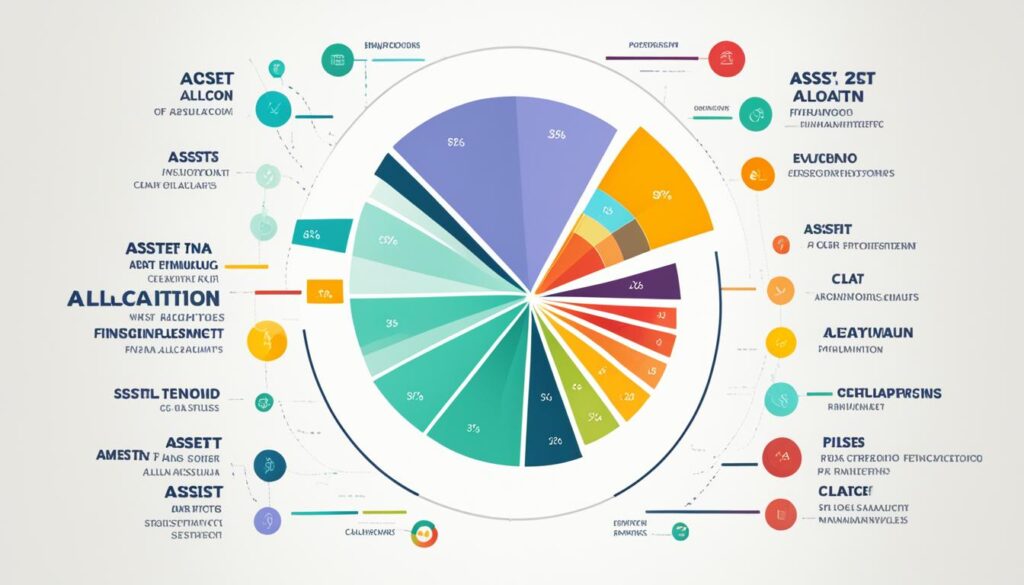Did you know that only 39% of Americans have enough savings to cover a $1,000 emergency expense? This startling statistic highlights the importance of strategic financial planning in today’s uncertain times.
Whether you’re aiming to grow your wealth, plan for retirement, or achieve your financial goals, smart financial planning is the key to success. By implementing effective investment strategies, understanding the role of personal finance, and making informed decisions about budgeting and asset allocation, you can pave the way for a secure and prosperous financial future.
Key Takeaways:
- Strategic financial planning is crucial for maximizing wealth and securing your future.
- Investment strategies play a significant role in growing your wealth over time.
- Retirement planning is essential to ensure a comfortable and financially stable future.
- Wealth management techniques can help preserve and grow your assets.
- Effective budgeting and asset allocation are key components of successful financial planning.
Understanding Financial Planning
Gaining a clear understanding of financial planning is vital for achieving your financial goals and securing a stable financial future. Financial planning involves a comprehensive approach to managing your finances, encompassing not only budgeting and saving but also investing and debt management.
Click here to purchase Credit Secrets Bible on Amazon
One of the key components of financial planning is personal finance. It involves effectively managing your income, expenses, and savings to ensure a healthy financial status. By creating a realistic budget and tracking your spending habits, you gain greater control over your financial life.
Investing is another critical aspect of financial planning. By intelligently allocating your resources into different investment vehicles, you can grow your wealth and work towards achieving your long-term financial goals. It’s essential to understand the various investment options available and consider factors such as risk tolerance and time horizon when making investment decisions.
Setting clear financial goals is a fundamental element in the financial planning process. By defining specific and measurable objectives, you can establish a roadmap for your financial success. Whether it’s saving for a dream home, funding your child’s education, or planning for retirement, setting goals helps you stay focused and motivated.
Furthermore, debt management plays a crucial role in financial planning. Understanding your existing debt, such as credit card balances or student loans, allows you to develop strategies for paying off debt efficiently and minimizing interest charges.
In summary, financial planning encompasses budgeting, saving, investing, and managing debt to achieve your financial goals. By formulating a well-rounded financial plan, you can work towards maximizing your wealth and securing your future.
The Role of a Financial Advisor
When it comes to financial planning and investment strategies, working with a financial advisor can be a game-changer. As a seasoned professional in the field, I understand the importance of guiding individuals towards their financial goals and helping them build a secure future. Let’s dive into the numerous benefits of having a financial advisor by your side.
Creating a Comprehensive Financial Plan
A financial advisor plays a crucial role in developing a comprehensive financial plan that aligns with your specific needs and goals. They will analyze your current financial situation, understand your short and long-term objectives, and develop a customized plan that maximizes your wealth. This plan will encompass various aspects such as budgeting, saving, investing, and managing debt, laying the foundation for your financial success.
Utilizing Expertise in Investment Strategies
“Investment strategies that consider your risk tolerance and financial goals are key to building wealth over time.”
An experienced financial advisor possesses a deep understanding of investment strategies that can help you grow your wealth. They have the expertise to guide you in selecting the right mix of investments based on your risk tolerance and financial objectives. Whether it’s stocks, bonds, mutual funds, or real estate, they will help you create a well-diversified portfolio that aligns with your overall financial plan.
Providing Guidance and Support
Financial decisions can often be overwhelming, especially when it comes to major life events or market uncertainties. A financial advisor acts as your trusted partner and provides ongoing guidance and support. They are there to answer your questions, alleviate your concerns, and provide valuable insights that can help you make informed decisions. This professional support can give you peace of mind, knowing that you have a knowledgeable and experienced advisor in your corner.
The Value of Objectivity
One of the significant advantages of working with a financial advisor is their objectivity in assessing your financial situation. They can offer an unbiased perspective and help you avoid emotional decision-making, particularly during market downturns or volatile times. This objectivity allows them to recommend strategies that align with your long-term financial goals rather than being influenced by short-term market fluctuations.
In conclusion, partnering with a financial advisor can greatly enhance your financial planning journey. They bring invaluable expertise, personalized guidance, and objective insights, ultimately empowering you to achieve your financial goals with confidence.
Investment Strategies for Financial Growth
Welcome to the exciting world of investment strategies for financial growth! In this section, we will explore different approaches that can help you maximize your wealth and achieve your financial goals. By understanding the power of strategic financial planning and asset allocation, you can make informed decisions to manage risk and optimize returns. Let’s dive in!
Click here to purchase Dailey Planner on Amazon
The Importance of Diversification
Diversification is a key investment strategy that involves spreading your investments across various asset classes, sectors, and geographical regions. By diversifying your portfolio, you can potentially reduce risk and minimize the impact of any individual investment’s performance on your overall wealth. This strategy allows you to benefit from the potential growth of different assets while mitigating the potential losses.
For example, instead of investing all your money in a single stock, you can allocate your funds across stocks, bonds, real estate, and other investment vehicles. This way, if one asset class underperforms, the others may be able to offset the losses, reducing the overall impact on your investment portfolio.
Harnessing the Power of Dollar-Cost Averaging
Dollar-cost averaging is another effective investment strategy that involves investing a fixed amount of money at regular intervals, regardless of the market’s ups and downs. By consistently investing a set amount, you can take advantage of market fluctuations and potentially buy more shares when prices are low and fewer shares when prices are high.
This strategy helps mitigate the impact of short-term market volatility, allowing you to accumulate more shares over time. Over the long haul, dollar-cost averaging can offer a potential advantage in achieving higher returns on your investments.
Embracing Long-Term Investing
Long-term investing is a strategy that focuses on holding investments for an extended period, usually over five years or more. This approach allows you to take advantage of the power of compounding and ride out short-term market fluctuations.
Instead of trying to time the market, long-term investing encourages you to stay invested for the long run and benefit from the growth potential of your investments over time. It’s important to exercise patience and avoid making rash decisions based on short-term market movements.
The Role of Asset Allocation
Asset allocation is a critical component of any investment strategy. It involves dividing your investment portfolio among different asset classes, such as stocks, bonds, cash, and alternative investments, based on your risk tolerance, financial goals, and investment horizon.
By carefully selecting the right mix of assets, you can manage risk effectively while pursuing growth opportunities. The key is to create a well-balanced portfolio that aligns with your individual circumstances and matches your long-term financial objectives.
Remember, investment strategies should be tailored to your specific financial situation and goals. It’s essential to consider factors such as your risk tolerance, time horizon, and investment knowledge when crafting your investment plan. Consulting with a financial advisor can provide valuable guidance on selecting the most suitable strategies for your needs.
Now that we’ve explored various investment strategies, let’s move on to the next section, where we’ll discuss planning for retirement and securing your financial future. Stay tuned!
Planning for Retirement
Retirement planning is a crucial aspect of financial planning, and it is never too early to start. As I strive to provide you with comprehensive guidance on your financial journey, this section will focus on the importance of retirement planning and offer actionable tips to ensure a secure and fulfilling retirement.
When it comes to saving for retirement, there are various options to consider. Employer-sponsored plans, such as 401(k)s, provide a convenient way to save for the future. These plans often come with matching contributions from your employer, allowing you to maximize your savings effortlessly. Individual retirement accounts (IRAs) are another popular choice, offering tax advantages and flexibility. Additionally, Social Security can provide a steady source of income during retirement.
I urge you to take advantage of these retirement savings vehicles to build a substantial nest egg. By contributing consistently and utilizing tax-efficient strategies, you can enhance your retirement funds and ensure financial stability in your golden years.
Calculating Your Retirement Needs
One of the first steps in retirement planning is calculating your retirement needs. This involves estimating the amount of money you will require to maintain your desired lifestyle once you retire. To do this, consider factors such as daily expenses, healthcare costs, travel plans, and any other financial commitments you anticipate.
By creating a comprehensive budget and factoring in inflation, you can determine the approximate amount you need for a comfortable retirement. Additionally, considering the length of your retirement and your expected lifespan is essential when planning for a financially secure future.
Creating a Retirement Savings Plan
Once you have a clear understanding of your retirement needs, it’s time to create a retirement savings plan. This plan should outline how much you need to save each month and the investment strategies you will employ to grow your retirement funds.

Consider consulting with a financial advisor to tailor a retirement savings plan that aligns with your goals and risk tolerance. They can provide valuable insights and recommendations based on their expertise and help you stay on track towards a comfortable retirement.
| Retirement Savings Tips |
|---|
| Start saving early and take advantage of compound interest. |
| Contribute to employer-sponsored retirement plans, such as a 401(k), and aim to maximize employer matching contributions. |
| Allocate your retirement savings across a diversified investment portfolio to manage risk. |
| Regularly review and adjust your retirement savings plan to accommodate changing circumstances and goals. |
| Consider utilizing catch-up contributions if you are age 50 or older. |
By following these tips and consistently saving towards your retirement goals, you can ensure a financially secure future and enjoy the fruits of your labor during your retirement years.
Managing Wealth Effectively
Managing your wealth is a key aspect of financial planning. By implementing effective strategies and working with professionals, you can preserve and grow your assets to ensure a secure financial future.
Strategies for Wealth Management
One important strategy for managing wealth is diversification. By spreading your investments across different asset classes, such as stocks, bonds, and real estate, you can reduce risk and increase the potential for higher returns.
“Diversification is key when it comes to wealth management. By not putting all your eggs in one basket, you can protect your assets in various market conditions.” – John Smith, Wealth Management Expert
Tax planning is another vital aspect of wealth management. By understanding the tax implications of your investments and utilizing tax-efficient strategies, you can minimize your tax burden and maximize your after-tax returns.
Estate planning is crucial for preserving wealth and ensuring your assets are distributed according to your wishes. Working with an estate planning professional can help you create a comprehensive plan that minimizes taxes and provides for your loved ones.
Risk management is an essential part of wealth management. Proper insurance coverage, such as life insurance and umbrella policies, can protect against unexpected events and safeguard your assets.
Working with Financial Professionals
To effectively manage your wealth, it’s beneficial to work with financial professionals who specialize in wealth management. These experts can assess your financial situation, develop a personalized plan, and provide ongoing guidance.
A financial advisor can help you navigate through complex investment options and determine the best strategies for your specific goals. They can provide valuable insights and expertise to optimize your portfolio and ensure it aligns with your risk tolerance and investment objectives.
An estate planning attorney can guide you through the intricacies of creating a comprehensive estate plan. They can ensure your assets are protected, minimize tax liabilities, and provide for the smooth transfer of wealth to future generations.
Effective wealth management requires a collaborative approach. Working with professionals who understand your unique financial situation and goals can help you make informed decisions and achieve long-term financial success.
The Importance of Budgeting
When it comes to financial planning, budgeting plays a crucial role. It is a powerful tool that allows you to take control of your finances and make informed decisions about your money. Budgeting helps you track your expenses, manage your debt, and ultimately, save for your financial goals. By creating a budget, you are establishing a roadmap for your financial future.
Creating a budget starts with understanding your income and expenses. Look at your monthly income, including your salary, investments, and any other sources of income. Then, list all your expenses, such as rent/mortgage, utilities, groceries, transportation, debt payments, and entertainment. It’s important to be thorough and realistic when accounting for your expenses.
Once you have a clear picture of your income and expenses, it’s time to analyze your spending habits. Identify areas where you can cut back or make adjustments. For example, if you notice that you’re spending a significant portion of your income on dining out, you can consider reducing that expense and cooking more meals at home.
As you create your budget, it’s essential to prioritize your financial goals. Whether you’re saving for a down payment on a house, paying off debt, or planning for retirement, allocating a portion of your income towards these goals will help you make progress. Set specific targets and regularly track your progress to stay motivated.
Maintaining a budget is an ongoing process. It’s important to review your budget regularly and make adjustments as needed. Life circumstances change, and your budget should adapt accordingly. By consistently monitoring your budget, you can identify any potential issues early on and make the necessary adjustments.
Remember, budgeting is not about restriction; it’s about making intentional choices with your money. It gives you the freedom to spend on the things that matter most to you while still working towards your financial goals. By prioritizing your spending and sticking to your budget, you can achieve financial stability and a brighter future.
Benefits of Budgeting:
- Helps track expenses and identify areas for savings
- Allows effective management of debt and repayment strategies
- Enables prioritization of financial goals
- Provides a clear understanding of cash flow
- Gives a sense of control over finances
“A budget is telling your money where to go instead of wondering where it went.” – Dave Ramsey
| Steps to Create and Maintain a Budget |
|---|
| 1. Assess your income and expenses |
| 2. Analyze your spending habits |
| 3. Prioritize your financial goals |
| 4. Allocate funds towards your goals |
| 5. Regularly review and adjust your budget |
Achieving Financial Goals
Setting and achieving financial goals is a crucial part of effective financial planning. By establishing clear objectives and implementing a well-defined plan of action, you can work towards achieving financial success and securing your future. In this section, I will discuss the importance of setting realistic goals, developing a plan, and overcoming obstacles on your financial journey.
The Importance of Setting Realistic Goals
When setting financial goals, it’s essential to ensure they are realistic and attainable. Setting overly ambitious goals may lead to frustration and discouragement. Instead, focus on setting goals that are specific, measurable, achievable, relevant, and time-bound (SMART). This approach allows you to break down larger goals into smaller, manageable steps, increasing the likelihood of success.
Developing a Plan of Action
Once you have established your financial goals, it’s important to develop a comprehensive plan of action. This plan should outline the specific strategies and steps you will take to achieve each goal. By creating a roadmap for your financial journey, you can stay focused and organized, making it easier to track your progress and make necessary adjustments along the way.
“By failing to prepare, you are preparing to fail.” – Benjamin Franklin
Overcoming Obstacles and Staying Motivated
While working towards your financial goals, it’s natural to encounter various obstacles that may challenge your progress. It could be unexpected expenses, market fluctuations, or unexpected life events. When faced with such challenges, it’s important to remain adaptable and resilient. Seek support from financial professionals, maintain a positive mindset, and stay motivated by visualizing the rewards and benefits of achieving your goals.
Remember, achieving financial goals is a journey, not a destination. Stay committed to your plan, regularly monitor your progress, and celebrate small victories along the way. With dedication and perseverance, you can transform your financial dreams into a reality.
| Strategies for Achieving Financial Goals | Benefits |
|---|---|
| 1. Budgeting | Helps track expenses, manage debt, and prioritize savings for goals. |
| 2. Saving and Investing | Grow wealth over time and generate additional income through investments. |
| 3. Minimizing Unnecessary Expenses | Maximize savings potential by cutting back on non-essential spending. |
| 4. Automating Savings | Ensure consistent savings contributions by setting up automatic transfers. |
| 5. Seeking Professional Advice | Benefit from expert guidance on financial planning and investment strategies. |
The Power of Asset Allocation
When it comes to financial planning and investment strategies, one concept that holds significant power is asset allocation. Asset allocation refers to the practice of dividing your investments among different asset classes, such as stocks, bonds, real estate, and cash, to create a balanced portfolio. This strategic approach can play a crucial role in optimizing returns while managing risk.
By diversifying your investments across various assets, you can potentially reduce the impact of market volatility on your portfolio. Different asset classes have varying levels of risk and return potential, so spreading your investments helps mitigate the impact of any single asset’s performance. It’s like the age-old saying, “Don’t put all your eggs in one basket.”
Asset allocation is not a one-size-fits-all approach. The right allocation mix varies based on your risk tolerance and financial goals. For example, if you have a higher risk tolerance and a longer investment horizon, you may have a higher allocation to stocks for potential long-term growth. On the other hand, if you have a lower risk tolerance or are closer to retirement, a higher allocation to bonds and cash may be suitable to preserve capital and provide income.
Understanding your risk tolerance is key to determining your asset allocation mix. Risk tolerance refers to your comfort level with market fluctuations and the potential for investment losses. Assessing your risk tolerance involves considering factors such as your investment goals, time horizon, financial situation, and emotional ability to handle market volatility.
Remember, asset allocation is not a set-it-and-forget-it strategy. It’s important to periodically review and rebalance your portfolio to maintain your desired allocation. As market conditions and your financial goals change, adjusting your allocation can help ensure your investments stay aligned with your objectives.
Benefits of Asset Allocation
By incorporating asset allocation into your financial planning, you can enjoy several benefits:
- Diversification: Asset allocation enables you to diversify your investments, spreading risk across different asset classes and potentially improving long-term returns.
- Risk Management: By strategically allocating your investments, you can manage risk and reduce the impact of market fluctuations on your portfolio.
- Opportunity for Growth: Investing in a variety of asset classes can provide exposure to different market sectors and opportunities for growth.
- Preservation of Capital: Through thoughtful allocation, you can protect your capital and preserve wealth, especially during market downturns.
When it comes to asset allocation, it’s essential to consider your individual financial goals, risk tolerance, and time horizon. Consulting with a financial advisor can provide valuable guidance and help develop a customized asset allocation strategy tailored to your unique circumstances.

| Asset Class | Asset Allocation Range | Description |
|---|---|---|
| Equities (Stocks) | 60-80% | Investing in shares of publicly traded companies, representing ownership in those companies. |
| Bonds | 10-30% | Loans made to governments, municipalities, or corporations, providing fixed income over a specified period. |
| Real Estate | 5-15% | Investing in properties, such as residential, commercial, or industrial, for potential rental income or capital appreciation. |
| Cash and Cash Equivalents | 0-10% | Highly liquid and low-risk assets, including cash, savings accounts, money market funds, and short-term Treasury bills. |
A well-designed asset allocation table can provide a visual representation of how you can distribute your investments across different asset classes.
Nurturing Long-Term Financial Success
When it comes to financial planning, adopting a long-term perspective is crucial. It allows you to build a solid foundation for your financial future and make informed decisions that align with your goals. By focusing on long-term success, you can enhance your financial well-being and achieve a sense of security.
Consistent saving is a key component of long-term financial success. By regularly setting aside a portion of your income, you can establish an emergency fund, invest in opportunities, and work towards achieving your financial goals. Saving consistently demonstrates discipline and creates a strong financial habit that pays off in the long run.
Disciplined investing is another vital aspect of long-term success. Investing wisely and diversifying your portfolio can help you capitalize on various market opportunities and minimize risk. By educating yourself about different investment strategies, such as asset allocation and long-term growth options, you can build a sustainable investment plan tailored to your needs.
Avoiding common financial mistakes is equally important in nurturing long-term financial success. Familiarize yourself with potential pitfalls like excessive debt, impulsive spending, and neglecting savings. By staying disciplined and making sound financial choices, you can safeguard your financial well-being and stay on track towards your goals.
Remember, financial planning is not a one-time task. Regularly reviewing and adjusting your financial plan is essential to ensure it remains aligned with your current circumstances, goals, and market conditions. Life is dynamic, and so should be your financial plan.
By nurturing long-term financial success through consistent saving, disciplined investing, and avoiding common financial mistakes, you can build a foundation of financial security. Stay proactive, educate yourself about investment strategies and continue to monitor and adjust your financial plan accordingly. With dedication and strategic planning, your financial goals are well within reach.
Takeaway:
- Adopt a long-term perspective when it comes to financial planning.
- Consistently save to build a strong financial foundation.
- Invest wisely and diversify your portfolio to maximize returns and minimize risk.
- Avoid common financial mistakes that can hinder long-term success.
- Regularly review and adjust your financial plan to stay on track.
Conclusion
In conclusion, strategic financial planning is essential for maximizing wealth and securing your future. By understanding the various components of financial planning, working with a financial advisor, implementing effective investment strategies, planning for retirement, managing wealth, budgeting, setting financial goals, and practicing asset allocation, you can pave the way for a financially secure future. Start today and take control of your financial well-being.
Click here to purchase Credit Secrets Bible on Amazon
FAQ
What is financial planning?
Financial planning involves the process of creating a roadmap to achieve your financial goals. It includes budgeting, saving, investing, managing debt, and creating a plan for retirement.
Why is financial planning important?
Financial planning is crucial because it helps you make informed financial decisions, maximize your wealth, and achieve your long-term goals. It provides a sense of control over your finances and ensures a secure financial future.
How can a financial advisor help me?
A financial advisor can assist you in creating a comprehensive financial plan tailored to your specific needs and goals. They provide expertise in investment strategies, retirement planning, and wealth management, helping you make informed decisions to achieve financial success.
What are some investment strategies for financial growth?
Some investment strategies for financial growth include diversification, dollar-cost averaging, and long-term investing. These strategies help manage risk and potentially increase your wealth over time.
How do I plan for retirement?
Planning for retirement involves saving for the future and ensuring a steady income when you stop working. It includes contributing to retirement accounts like 401(k)s and IRAs, estimating retirement needs, and creating a savings plan to meet those needs.
What is wealth management?
Wealth management involves strategies to preserve and grow your assets. It includes diversifying investments, tax planning, estate planning, and managing risks to ensure long-term financial stability.
Why is budgeting important?
Budgeting is important because it helps you track expenses, manage debt, and save for your financial goals. It provides a clear picture of your financial situation and enables you to make informed spending decisions.
How can I achieve my financial goals?
To achieve your financial goals, it is important to set realistic goals, develop a plan of action, and monitor your progress. Create a budget, save consistently, invest wisely, and stay motivated on your financial journey.
What is asset allocation?
Asset allocation is the process of spreading your investments across different asset classes, such as stocks, bonds, and real estate, to manage risk and optimize returns. It helps balance your portfolio based on your risk tolerance and financial goals.
What should I do for long-term financial success?
For long-term financial success, it is important to save consistently, invest wisely, and avoid common financial mistakes. Review and adjust your financial plan regularly to adapt to changing circumstances and stay on track toward your goals.



Very excellent information can be found on blog.Raise blog range